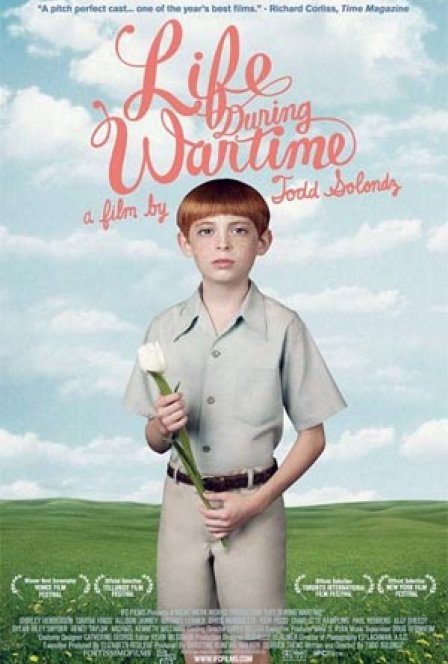Life During Wartime begins in media res, as we’re plopped down into a plush booth in a nice restaurant for a dinner date that’s a minefield of awkwardly emotional pauses. Joy (Shirley Henderson) appears on the verge of tears, and her distress is making her date Allen (Michael Kenneth Williams) look like he’s about to break down, too. He gives her a gift, an antique ashtray engraved with her name that he bought on eBay, and Joy’s tears get the better of her. She blames it on déjà vu, and those familiar with the work of director Todd Solondz can identify: although featuring different actors and a new set 10 years later, this scene perfectly apes the opening of his 1998 masterpiece, Happiness. Back then, Joy (Jane Adams) received the exact same ashtray from her date Andy (Jon Lovitz) after breaking up with him. Now, she’s feeling a similar mixture of gratefulness and dread, since the reason the gift was on eBay at all was because Andy killed himself. But while Joy’s déjà vu is traumatic, ours is pleasurable on multiple levels. Unless you’re immune to schadenfreude, the tragic repetition is funny, and like most of Solondz’s work, complexly so, propelled by contradictory forces: forgetting and remembering.
It’s a wickedly clever introduction for a film that’s deeply interested in memory and forgiveness. A sequel of sorts to Happiness, Life During Wartime follows characters who are still dealing with the fallout from the events of the former movie. And by “events,” of course, I mean the traumatic ones. Sure, Helen (Ally Sheedy) makes an appearance, having moved from New Jersey to Los Angeles and ditched prose for screenplays and her new boytoy “Keanu.” But the real weight of the film hangs around the necks of Bill (Ciarán Hinds), now finished with his prison sentence for child rape, and Joy, still haunted by Andy’s (Paul Ruebens) suicide. Each is on a parallel journey to make peace with the past. After finding out that her date still gets off on verbally molesting random women from the phone book, Joy leaves Allen for a trip to visit her family. Along the way, she meets Andy’s ghost, and the two take a trip down memory lane. Meanwhile, Bill is acting pretty ghostly himself, sneaking into his ex-wife Trish’s (Allison Janney) house to peek at pictures of his youngest son, but never making himself known to anyone besides his son Billy (Chris Marquette), who he visits at his college dorm room to ask forgiveness for fucking his childhood friends.
If none of this sounds like a Solondz film, well, it doesn’t exactly feel like one either. The introductory scene, for all its brilliance, is a bait and switch. Aside from Trish telling her young son Timmy (Dylan Riley Snyder), in detail, that she was still soaking wet from a date she just got home from, there’s little of the humor that Solondz is known for. He even dips his toes into the waters of American Zionism, perhaps the last unexplored comedic frontier for pissing off American audiences, without bothering to offend. What’s disappointing, though, isn’t the jokes that are missing; it’s that the ones that are there, while funny, are merely distractions. It’s a far cry from Happiness, where every joke, no matter how sick, felt like the crucial Jenga piece holding up that film’s tower of misanthropy and sympathy. Life During Wartime has an altogether different aesthetic than its “predecessor,” as well. Happiness, with its perspective shots and lack of unnecessary cinematic trickery, was almost theatrical. Life During Wartime is of a less rigid aesthetic, full of “cinematographic” sequences and complexly framed shots. There’s even Devendra Banhart music. Gulp.
But these disparities make sense, to a certain extent. Happiness might have been a perfectly formed worldview, but it wasn’t a film about ideas. Its message was in the characters, and their dialogue was to be taken literally, if also ironically. Life During Wartime, on the other hand, is filled with symbols and ideas. When Timmy talks about forgiveness and forgetting, it’s not a kid talking about his father the pedophile; it’s a narrator expounding on metaphysics. While it’s intriguing to watch Solondz dive into such difficult and unfamiliar territory, his message seems a bit muddled.
Still, despite the film’s singularity in his oeuvre, in some ways Life During Wartime isn’t such a departure for Solondz. For me, his work has always been intensely interested in experimenting with the audience’s response, and I can think of few better ways to test those limits than filming a sequel to your most beloved film that abandons much of what made the original so impressive. That act in itself poses more interesting questions about forgiveness and forgetting than any of the characters in the film.

